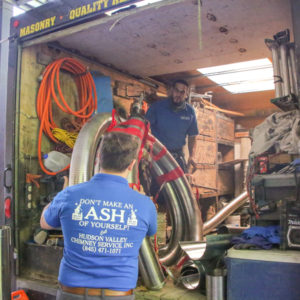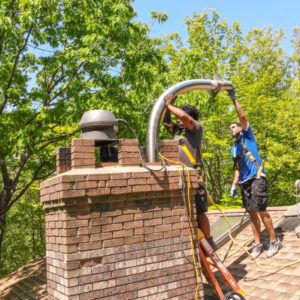How Does a Chimney Liner Affect My Chimney?
When you think about your fireplace, is the liner the first thing that comes to mind? Probably not. It’s even less likely you’re thinking- how does my fireplace liner affect my chimney? If you’re not thinking about your chimney liner and how it impacts your chimney, you should be. Let’s take a closer look at fireplace liners and what they do.
 What is a Chimney Liner?
What is a Chimney Liner?
A chimney liner is a protective barrier that protects the structure of your home from becoming too hot and catching on fire and keeps harmful gases from entering your home. Usually, a fireplace liner is made of metal or is ceramic and can withstand high temperatures while insulating your fireplace. It also protects from heat to the masonry of your chimney. You may ask if you should get a chimney liner, but if your home is newer, you may already have one. State and local codes have required a chimney liner to be in all new construction for the last several decades. According to the National Bureau of Standards, without it, your house would catch on fire in under four hours.
How Does a Chimney Liner Affect My Chimney’s Structure?
A Chimney liner doesn’t just keep your home safe from catching on fire; it also protects your chimney’s masonry. It protects the brick and mortar of your chimney from the heat that could break it down. It also guards against harmful chemicals from smoke like creosote that can corrode and eat away at your chimney’s structure over time. If chemicals break down your chimney’s mortar joints from smoke, it can cause your chimney to begin to crumble and eventually collapse. Eroded mortar can also become porous and allow gases such as carbon monoxide to seep into your home.
Chimney Liners Improve Efficiency
Chimney liners do more than just protect your chimney; they also can improve its efficiency. The right flue size is required for wood-burning stoves and furnaces to perform at optimum levels. The chimney acts as a passageway that allows chemicals caused by burning wood or gas to safely exit your home and produces a draft that allows gases to escape the chimney.
If the liner inside your chimney is the incorrect size or if there is no liner, the gases and their chemicals won’t be lifted by the draft. This issue may lead to a wood-burning stove experiencing excess creosote buildup, which can become a hazard if not dealt with quickly.
The Types of Chimney Liners
As we stated earlier, the most common types of chimney liners are ceramic and metal, but there is also a third type. Let’s look a little closer at all three.
Ceramic liners are made from clay and are affordable. You should remember ceramic liners don’t absorb heat quickly if a severe temperature change occurs, such as in a chimney fire, so the clay tile could crack if a chimney fire occurs. For that reason, it’s crucial to have your chimney inspected at least every twelve months to keep fires from happening.
A cast-in-place chimney liner is cement-like in its consistency, making it a lightweight liner that shields your chimney from gases. Cast-in-place liners are especially useful for older chimneys by strengthening their structural integrity. The drawback to a cast-in-place chimney liner is that they can be expensive and are hard to install.
Metal chimney liners are aluminum or steel and help fix or improve a chimney. They are safe and exceptionally long-lasting, giving your chimney long-term protection. The downside to metal liners is their price; they can be as expensive as a cast-in-place chimney liner.

To Sum Up
Chimney liners protect the structure of your chimney and are vital in venting dangerous gases from your home. Chimney liners are also key to the efficiency of wood-burning stoves and furnaces.
What is the Condition of Your Chimney’s Liner?
Has it been a few years since your chimney was inspected? Do you know the condition of your liner? Let Hudson Valley Chimney Incorporated Inspect your chimney’s liner. Our inspectors are not only experienced, but they are also CSIA Certified, fully licensed, and insured. Call us today; one of our helpful staff will schedule an inspector to come out and check your chimney’s liner. Make sure that your chimney liner is doing its job. Call us today.





